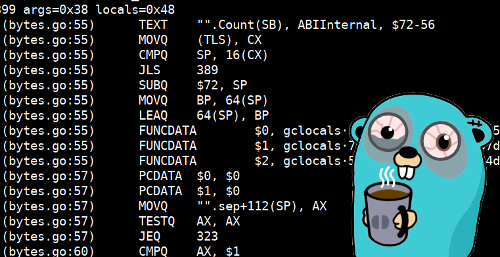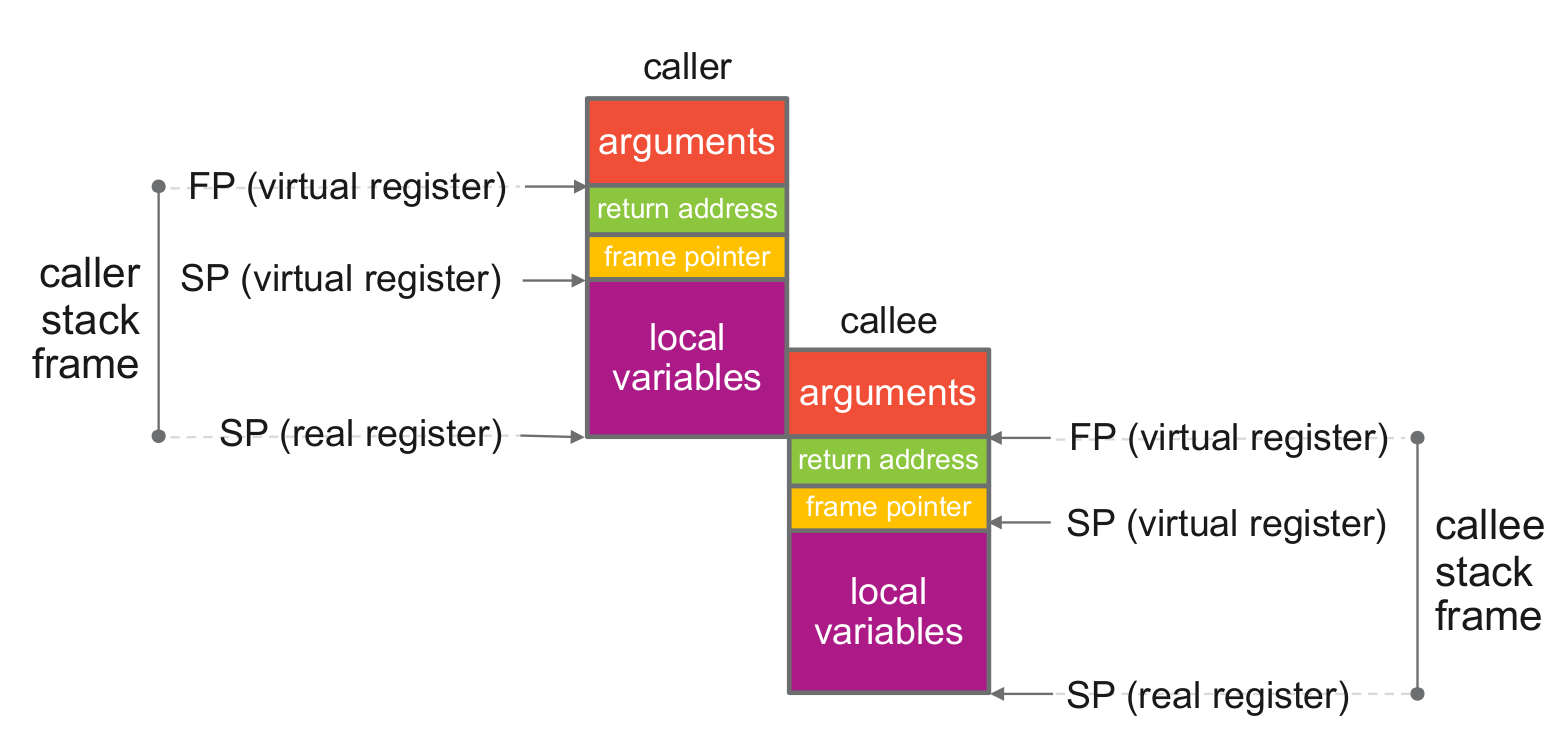You've run into a really hairy area of asm code.
My first suggestion is not try to call from assembler into Go. - Ian Lance Taylor
As long as your assembler code does something simple, everything looks good.
As soon as you have a task to call a function from the assembler code of Go, one of the first tips that you will be given: do not do this.
But what if you really, really need it? In that case, please, under cat.

Calling convention
It all starts with the fact that you need to understand how to pass arguments to functions and how to accept its results .
I recommend that you familiarize yourself with Go functions in assembly language , where most of the information we need is clearly described.
Typically, calling convention varies from platform to platform, as the set of available registers may vary. We will only consider GOARCH=amd64, but in the case of Go, the conventions differ not so significantly.
Here are some features of the function calling convention in Go:
- All arguments are passed through the stack, except for the "context" in the closures, it is accessible through the register
DX(% rdx). - ( arguments).
- .
- . , .
, . .

, register-based calling convention. Go.
, :
- , .
0(SP), 8(SP) ( 8 ), .n(SP), n — . int64, 16(SP).
.
package main
func asmfunc(x int32) (int32, int32)
func gofunc(a1 int64, a2, a3 int32) (int32, int32) {
return int32(a1) + a2, int32(a1) + a3
}
func main() {
v1, v2 := asmfunc(10)
println(v1, v2)
}
// func asmfunc(x int32) (int32, int32)
TEXT ·asmfunc(SB), 0, $24-12
MOVL x+0(FP), AX
MOVQ $1, 0(SP) // (a1 int64)
MOVL $2, 8(SP) // (a2 int32)
MOVL AX, 12(SP) // (a3 int32)
CALL ·gofunc(SB)
MOVL 16(SP), AX //
MOVL 20(SP), CX //
MOVL AX, ret+8(FP) //
MOVL CX, ret+12(FP) //
RET
$24-16 (locals=24 bytes, args=16 bytes)
0 8 12 16 20 SP
locals=24 [a1:8][a2:4][a3:4][ret:4][ret:4]
(ret asmfunc, gofunc)
0 4 8 12 FP
args=16 [x:4][padding:4][ret:4][ret:4]
(ret main, asmfunc)
, 4 . , , (8 amd64).
, . — int32, — int64, offset 8, 4, reflect.TypeOf(int64(0)).Align() 8.
, FP go vet.
stackmap
-.
package foo
import (
"fmt"
"testing"
)
func foo(ptr *object)
type object struct {
x, y, z int64
}
func printPtr(ptr *object) {
fmt.Println(*ptr)
}
func TestFoo(t *testing.T) {
foo(&object{x: 11, y: 22, z: 33})
}
TEXT ·foo(SB), 0, $8-8
MOVQ ptr+0(FP), AX
MOVQ AX, 0(SP)
CALL ·printPtr(SB)
RET
, - stackmap:
=== RUN TestFoo
runtime: frame <censored> untyped locals 0xc00008ff38+0x8
fatal error: missing stackmap
, , GC stackmaps. Go , .
stub ( Go ). , stackmap , .
, stackmap (), NO_LOCAL_POINTERS ( ).
NO_LOCAL_POINTERS
TestFoo :
#include "funcdata.h"
TEXT ·foo(SB), 0, $8-8
NO_LOCAL_POINTERS
MOVQ ptr+0(FP), AX
MOVQ AX, 0(SP)
CALL ·printPtr(SB)
RET
, .
, ? , , "" , , , , ?
, heap, , . , , . GC "" , , .
, , "" (escapes to heap) escape analysis, , .
NO_LOCAL_POINTERS: , , , GC . .
Go non-cooperative preemption, , .
Go. , go:nosplit, , , NO_LOCAL_POINTERS .
GO_ARGS
, Go prototype, GO_ARGS.
GO_ARGS — funcdata.h, NO_LOCAL_POINTERS. , stackmap Go .
, stackmap . args_stackmap . : , stackmap.
GO_RESULTS_INITIALIZED
Go , ( ) GO_RESULTS_INITIALIZED .
:
// func getg() interface{}
TEXT ·getg(SB), NOSPLIT, $32-16
// .
// .
MOVQ $0, ret_type+0(FP)
MOVQ $0, ret_data+8(FP)
GO_RESULTS_INITIALIZED
// ...
RET
, , -.
GitHub.
Go JIT-
Go .
Garbage collector Go , , , , , Go JIT'.
, . , , .
calljit-v1
package main
import (
"log"
"reflect"
"syscall"
"unsafe"
)
func main() {
a := funcAddr(goFunc)
code := []byte{
0xb8, byte(a), byte(a >> 8), byte(a >> 16), byte(a >> 24),
0xff, 0xd0,
0xc3,
}
executable, err := mmapExecutable(len(code))
if err != nil {
log.Panicf("mmap: %v", err)
}
copy(executable, code)
calljit(&executable[0])
}
func calljit(code *byte)
func goFunc() {
println("called from JIT")
}
func mmapExecutable(length int) ([]byte, error) {
const prot = syscall.PROT_READ | syscall.PROT_WRITE | syscall.PROT_EXEC
const flags = syscall.MAP_PRIVATE | syscall.MAP_ANON
return mmapLinux(0, uintptr(length), prot, flags, 0, 0)
}
func mmapLinux(addr, length, prot, flags, fd, off uintptr) ([]byte, error) {
ptr, _, err := syscall.Syscall6(
syscall.SYS_MMAP,
addr, length, prot, flags, fd, offset)
if err != 0 {
return nil, err
}
slice := *(*[]byte)(unsafe.Pointer(&reflect.SliceHeader{
Data: ptr,
Len: int(length),
Cap: int(length),
}))
return slice, nil
}
func funcAddr(fn interface{}) uintptr {
type emptyInterface struct {
typ uintptr
value *uintptr
}
e := (*emptyInterface)(unsafe.Pointer(&fn))
return *e.value
}
// file jit_amd64.s
TEXT ·calljit(SB), 0, $0-8
MOVQ code+0(FP), AX
JMP AX
, ( ):
$ go build -o jit . && ./jit
called from JIT
goFunc, JIT-:
func goFunc() {
println("called from JIT")
+ runtime.GC()
}
:
$ go build -o jit . && ./jit
called from JIT
runtime: unexpected return pc for main.goFunc called from 0x7f9465f7c007
stack: frame={sp:0xc00008ced0, fp:0xc00008cef0} stack=[0xc00008c000,0xc00008d000)
000000c00008cdd0: 0000000000000000 00007f94681f7558
000000c00008cde0: 000000c000029270 000000000000000b
... (+ more)
: unexpected return pc for main.goFunc called from 0x7f9465f7c007, 0x7f9465f7c007 — JIT-. , runtime.
, , FP BP return address , .
Go runtime , JIT-, , .
calljit , , Go . , Go , , Go (calljit).
#include "funcdata.h"
TEXT ·calljit(SB), 0, $8-8
NO_LOCAL_POINTERS
MOVQ code+0(FP), AX
JMP AX
callgo:
CALL CX
JMP (SP)
:
- 8 , return address JIT .
NO_LOCAL_POINTERS - , CALL.
calljit , , , Go . , CX , [rsp] — , .
, callgo. , . main():
a := funcAddr(goFunc)
j := funcAddr(calljit) + 36
code := []byte{
0x48, 0xc7, 0xc1, byte(a), byte(a >> 8), byte(a >> 16), byte(a >> 24),
0x48, 0xc7, 0xc7, byte(j), byte(j >> 8), byte(j >> 16), byte(j >> 24),
0x48, 0x8d, 0x35, (4 + 2), 0, 0, 0,
0x48, 0x89, 0x34, 0x24,
0xff, 0xe7,
0x48, 0x83, 0xc4, (8 + 8),
0xc3,
}
CX, callgo DI, SI , [rsp]. 4+2 — LEAQ .
, , ADDQ. 8 8 BP.
calljit:
return address callgo
|
| Go BP
| |
0(SP) 8(SP) 16(SP) 24(SP)
[empty] [prevBP] [retaddr] [arg1:code]
| / | |
| / | calljit (caller frame)
| / |
| / CALL calljit
| /
calljit frame, 16 bytes
runtime.GC():
$ go build -o jit . && ./jit
called from JIT
Go . , — , .
, , . Go.
Go Internal ABI
Go Internal ABI — .
Go , , . ABI, , .
:
- .
- .
calling convention ABI0, ABIInternal.
Go -S, , ABIInternal , ABI0:

ABIInternal , ABI1, . ABIInternal calling convention .
, .
, Go . , .

Hub-
, . , , , . .